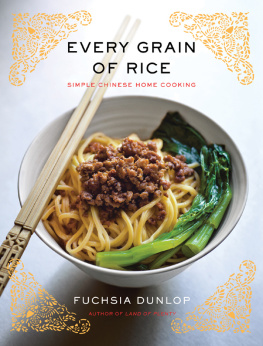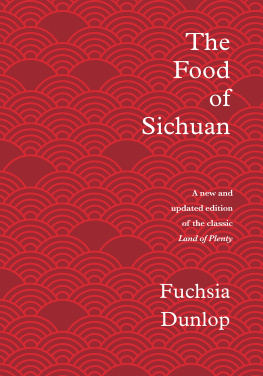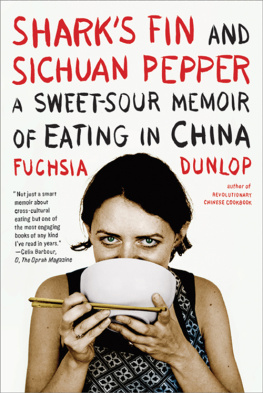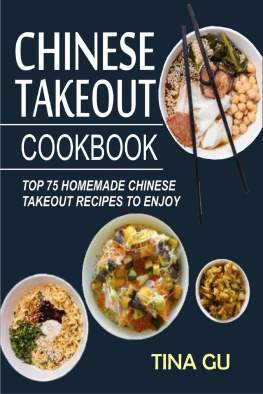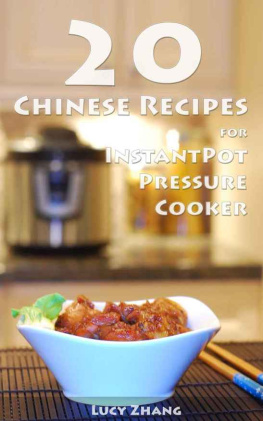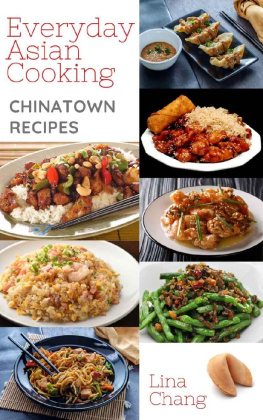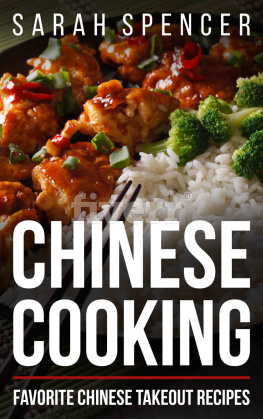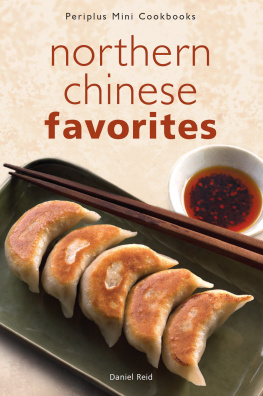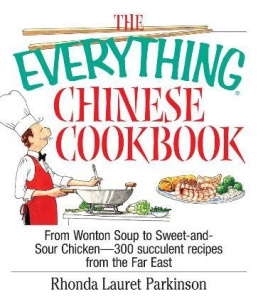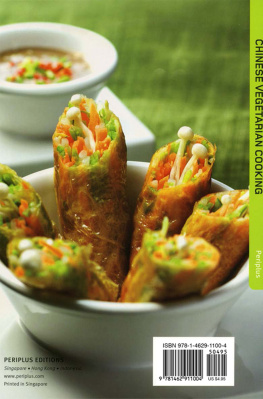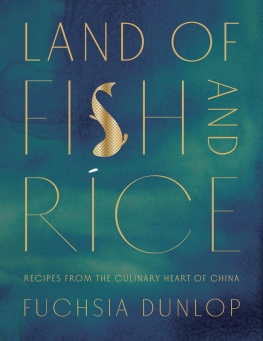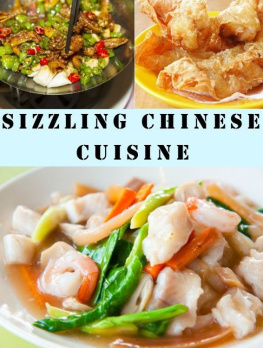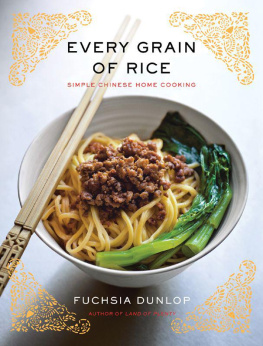

Text copyright 2012 by Fuchsia Dunlop
Photography copyright 2012 by Chris Terry
Illustrations copyright 2012 by Caroline Clark
First American Edition 2013
The quotation on page 135 is reproduced by permission of Oxford
University Press and is taken from The Works of Mencius: A New
Translation Arranged and Annotated for the General Reader ,
translated by W. A. C. H. Dobson (Oxford University Press, 1963),
pages 2728.
All rights reserved
Printed in China
For information about permission to reproduce
selections from this book, write to Permissions,
W. W. Norton & Company, Inc.,
500 Fifth Avenue, New York, NY 10110
For information about special discounts for bulk
purchases, please contact W. W. Norton Special Sales
at specialsales@wwnorton.com or 800-233-4830
Manufacturing by C & C Offset Printing Co. Ltd.
Book design by carolineclark.co.uk
ISBN 978-0-393-08904-2
ISBN 978-0-393-24121-1 (e-book)
W. W. Norton & Company, Inc.
500 Fifth Avenue, New York, N.Y. 10110
www.wwnorton.com
W. W. Norton & Company Ltd.
Castle House, 75/76 Wells Street, London W1T 3QT
CONTENTS
If you are going to follow links, please bookmark your page before linking.
For Leonie
The farmer hoes his rice plants in the noonday sun
His sweat dripping on to the earth
Who among us knows that every grain of rice in our bowls
Is filled with the bitterness of his labor.
Li Shen
This book, simple as it is, has grown out of many years of cooking and eating in China, and it would be impossible to list here the names of everyone who has played a part in it. I would like, however, to thank a few people in particular.
The team at Barshu restaurant in London have been a fantastic support to me in so many ways. Owner Shao Wei and managers Juanzi, Sherrie Looi and Anne Yim have done everything possible to encourage me in this and many other projects. Head Chef Zhang Xiaozhong has been extraordinarily generous with his expertise, answering innumerable questions and helping me with the testing of recipes on several occasions. Im also very grateful to Chef Wei Guirong, who assisted me in cooking for the photoshoots, and from whom I have learned so much in terms of dumpling-making. Chefs Fu Bing of Baozi Inn and Li Xue, Zhou Bo and Zheng Qingguo of Bashan have given me advice on certain recipes; and all the other staff have been delightful colleagues.
In China, A Dai (Dai Jianjun), the owner of the Dragon Well Manor restaurant in Hangzhou, has been one of the strongest influences on my research and my cooking in recent years. I find his passion for Chinas traditional cuisine, culture and agriculture, and his efforts to preserve them for future generations, tremendously inspiring, and Ive had the most wonderful times with him and his team, going fishing, gathering wild fruits, sharing meals in rural homes and, of course, eating the incomparable food in his restaurant. So thank you to A Dai and to everyone in the great cao tang family for making me feel at home, especially Chefs Dong Jingmu, Guo Ming and Yang Aiping, Qian Lu, Zhou Shifu, He Shifu, Xiatian and Xueyan.
In Chengdu, where my Chinese culinary explorations began and which remains one of my richest sources of recipes, my old friends Yu Bo and Dai Shuang have patiently answered a stream of questions, accompanied me on market visits and fed me with unbelievable delicacies. Their commitment to their craft is remarkable, and their knowledge of Sichuanese cuisine truly astonishing. A big thank you to them, and to the other staff of their marvellous restaurant, Yu Jia Chu Fang, in particular Xiao Huang and Guo Liang.
For their encouragement and support over many years I would like to thank Wang Xudong, editor of Sichuan Cuisine magazine; Professor Jiang Yuxiang of Sichuan University; Professor Du Li of the Sichuan Institute of Higher Cuisine; Liu Yaochun and Liu Jun; Sansan and Liu Wei; Feng Quanxin and Qiu Rongzhen; Li Shurong; Feng Rui; Susan Jung and Nigel Kat; Lai Wu; Lan Guijun; Hugo Martin; Francesca Tarocco; Nunzia Carbone; Gwen Chesnais; and Wu Xiaoming. Special thanks also to the amazing Rose Leng for arranging a couple of emergency shipments from Hong Kong at inconceivably short notice!
Back home, thank you to Lambros Kilaniotis for his ceaseless support and enthusiastic eatingI couldnt have done this without you; Zo Waldie, my ever-wonderful agent; Carolyn Dunlop, for her help in testing (and tasting!) recipes; Anissa Helou for fun, food adventures and writerly camaraderie; Chef Jerome Henry for trying out some of my recipes; Seema Merchant, for her invaluable advice; Nikki Johnson at the BBC for her patience, forbearance and good humour; the staff of the Shanghai restaurant in Dalston for advice on tofu; and my local guinea pigs Sam Chatterton Dickson, Cathy Roberts and Simon Robey for their comments on my culinary experiments.
Im also very grateful to my editors, Richard Atkinson and Natalie Hunt at Bloomsbury, and Maria Guarnaschelli at W. W. Norton, for their enthusiastic commitment to the book and the immense creative effort they have put into its production; to Caroline Clark for her beautiful designs; to the very patient and apparently unflappable Lucy Bannell for her work on the text; to Chris Terry for his mouthwatering photographs; and to Cynthia Inions for her styling of the shoots.
Finally, although Ive tried to reproduce recipes faithfully and to write accurately, any errors are entirely my own.
The Chinese know, perhaps better than anyone else, how to eat. Im not talking here about their exquisite haute cuisine, or their ancient tradition of gastronomy. Im talking about the ability of ordinary Chinese home cooks to transform humble and largely vegetarian ingredients into wonderful delicacies, and to eat in a way that not only delights the senses, but also makes sense in terms of health, economy and the environment.
Not long ago I was invited to lunch in a farmhouse near Hangzhou, in eastern China. In the dining room, the grandmother of the household, Mao Cailian, had laid out a selection of dishes on a tall, square table. There were whole salted duck eggs, hard-boiled and served in their shells, fresh green soy beans stir-fried with preserved mustard greens, chunks of winter melon braised in soy sauce, potato slivers with spring onion, slices of cured pigs ear, tiny fried fish, the freshest little greens with shiitake mushrooms, stir-fried eggs with spring onions, purple amaranth with garlic, green bell pepper with strips of tofu, and steamed eggs with a little ground pork, all served with plain steamed rice. Most of the vegetables on the table were home-grown and the hens eggs came from birds that pecked around in the yard.
Ill never forget that meal, not only because it was one of the most memorably delicious that I have had in China, but also because it was typical of a kind of Chinese cooking that has always impressed me. The ingredients were ordinary, inexpensive and simply cooked and there was very little meat or fish among the vegetables, and yet the flavors were so bright and beautiful. Everything tasted fresh and of itself. Mrs. Mao had laid on more dishes than usual, because she was entertaining guests, but in other respects our lunch was typical of the meals shared by families across southern China.
European visitors to China since the time of Marco Polo have been struck by the wealth of produce on sale in the countrys markets: fresh fish and pork, chickens and other birds, exquisite hams and an abundance of vegetables. The rich variety of ingredients, especially vegetables, in the Chinese diet is still striking. I remember researching an article about school dinners in China in the wake of Jamie Olivers campaign to improve them in Britain. I came across a group of children at a Chengdu state school lunching, as they did every day, on a selection of dishes made from five or six different vegetables, rice and a little meat, all freshly cooked and extremely appetizing.
Next page
